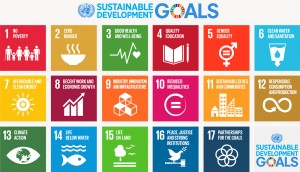 On the 15th April Dr. David Nabarro, the UN Secretary-General’s Special Adviser on the 2030 Agenda, briefed NGOs on progress of implementation of the SDGs (Sustainable Development Goals). According to Dr. Nabarro the SDGs represent the biggest upheaval in thinking and working that he’s seen in his career – it requires a radical change in the way of thinking and acting of all of us.
On the 15th April Dr. David Nabarro, the UN Secretary-General’s Special Adviser on the 2030 Agenda, briefed NGOs on progress of implementation of the SDGs (Sustainable Development Goals). According to Dr. Nabarro the SDGs represent the biggest upheaval in thinking and working that he’s seen in his career – it requires a radical change in the way of thinking and acting of all of us.
He started with a review of some of the major steps made in 2015 such as the Financing for development meeting in Addis Ababa, the meeting on disaster risk reduction in Japan and the COP-21 Paris agreement on climate change which will be opened for signing on the 22nd April.
The briefing then went onto explain how the SDGs cover the three pillars of the UN – peace and security, human rights and justice and development. They link together the social, economic and environmental dimensions of poverty and can be summed up by the five Ps: people, planet, peace, prosperity and partnership.
He said that the immediate task now is to spread the word to all people as to what the SDGs are, and empower them to hold their governments to account in regard to their implementation. The target is that by 2017, two billion people will know about the goals, that their world leaders have agreed. In addition it is aimed to create 1,000 activists each day between now and the end of 2017 to spread the word. This will be done by cascading information out through civil society, in churches, schools, labour unions, NGOs etc. NGOs are also needed on the ground to monitor implementation and develop understanding of what the SDGs mean for the world.
According to Dr. Nabarro, to implement the SDGs we need an enlightened ‘horizontal’ approach with all people, business and governments working together to ensure that no one is left behind and the elimination of barriers, duplication and competition between different organisations. Going further we need to look at the big picture and take the SDGs not as separate goals but one indivisible agenda for the future of humankind.
Nicholas Webster, ERI intern